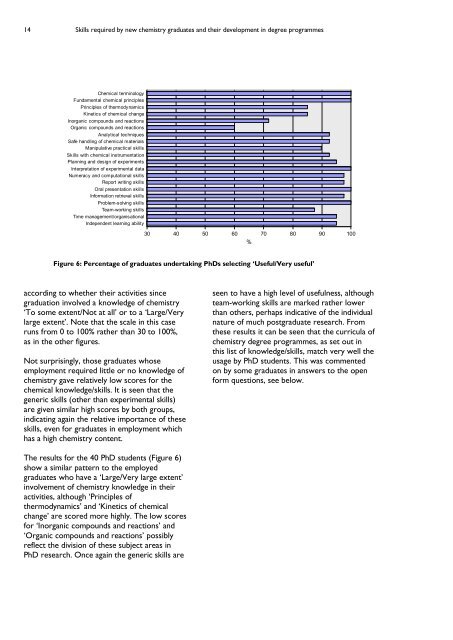Skills required by new chemistry graduates - Higher Education ...
Skills required by new chemistry graduates - Higher Education ...
Skills required by new chemistry graduates - Higher Education ...
Create successful ePaper yourself
Turn your PDF publications into a flip-book with our unique Google optimized e-Paper software.
14 <strong>Skills</strong> <strong>required</strong> <strong>by</strong> <strong>new</strong> <strong>chemistry</strong> <strong>graduates</strong> and their development in degree programmes<br />
Chemical terminology<br />
Fundamental chemical principles<br />
Principles of thermodynamics<br />
Kinetics of chemical change<br />
Inorganic compounds and reactions<br />
Organic compounds and reactions<br />
Analytical techniques<br />
Safe handling of chemical materials<br />
Manipulative practical skills<br />
<strong>Skills</strong> with chemical instrumentation<br />
Planning and design of experiments<br />
Interpretation of experimental data<br />
Numeracy and computational skills<br />
Report writing skills<br />
Oral presentation skills<br />
Information retrieval skills<br />
Problemsolving skills<br />
Teamworking skills<br />
Time management/organisational<br />
Independent learning ability<br />
30 40 50 60 70 80 90 100<br />
%<br />
Figure 6: Percentage of <strong>graduates</strong> undertaking PhDs selecting ‘Useful/Very useful’<br />
according to whether their activities since<br />
graduation involved a knowledge of <strong>chemistry</strong><br />
‘To some extent/Not at all’ or to a ‘Large/Very<br />
large extent’. Note that the scale in this case<br />
runs from 0 to 100% rather than 30 to 100%,<br />
as in the other figures.<br />
Not surprisingly, those <strong>graduates</strong> whose<br />
employment <strong>required</strong> little or no knowledge of<br />
<strong>chemistry</strong> gave relatively low scores for the<br />
chemical knowledge/skills. It is seen that the<br />
generic skills (other than experimental skills)<br />
are given similar high scores <strong>by</strong> both groups,<br />
indicating again the relative importance of these<br />
skills, even for <strong>graduates</strong> in employment which<br />
has a high <strong>chemistry</strong> content.<br />
seen to have a high level of usefulness, although<br />
team-working skills are marked rather lower<br />
than others, perhaps indicative of the individual<br />
nature of much postgraduate research. From<br />
these results it can be seen that the curricula of<br />
<strong>chemistry</strong> degree programmes, as set out in<br />
this list of knowledge/skills, match very well the<br />
usage <strong>by</strong> PhD students. This was commented<br />
on <strong>by</strong> some <strong>graduates</strong> in answers to the open<br />
form questions, see below.<br />
The results for the 40 PhD students (Figure 6)<br />
show a similar pattern to the employed<br />
<strong>graduates</strong> who have a ‘Large/Very large extent’<br />
involvement of <strong>chemistry</strong> knowledge in their<br />
activities, although ‘Principles of<br />
thermodynamics’ and ‘Kinetics of chemical<br />
change’ are scored more highly. The low scores<br />
for ‘Inorganic compounds and reactions’ and<br />
‘Organic compounds and reactions’ possibly<br />
reflect the division of these subject areas in<br />
PhD research. Once again the generic skills are
















